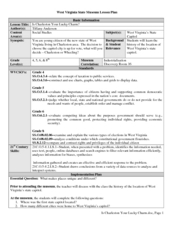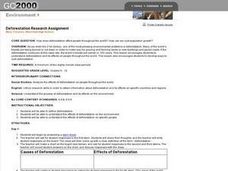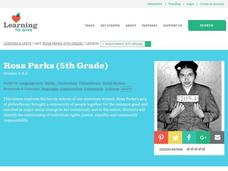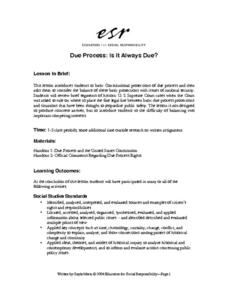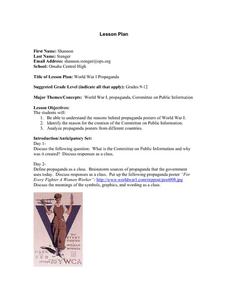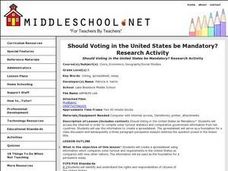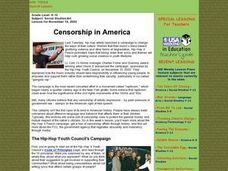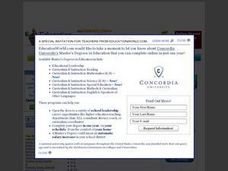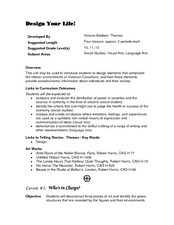Curated OER
Water and Ice
Students explore the physical properties of water. For this water lesson, students explore water as it changes states. They observe, measure and use communication skills to describe change.
Curated OER
U.S. Constitution
Learners examine the U.S. Constitution. In this American government lesson, students explore the purpose and significance of the Constitution as they read the provided handouts and complete the provided worksheet.
Curated OER
The Constitution and The Bill of Rights
Studnets explore the events and issues surrounding the Constitutional Convenetion and the Bill of Rights through web-sites interacting with such topics as the framers, court cases, games and more.
Curated OER
Is Charleston Your Lucky Charm?
Students determine what makes Charleston, West Virginia unique. In this West Virginia history instructional activity, students explore the West Virginia History Museum to identify why Charleston became the capitol of the state.
Curated OER
Deforestation Research Assignment
Students examine deforestation and the effects of deforestation on the environment as well as the effects it has on specific people. Students research an area in the world where deforestation is taking place and present their...
Curated OER
Progressivism: What's the Problem?
Eighth graders interpret historical evidence presented in primary and secondary resources. In this Progressive Era lesson, students examine the goals and accomplishments of the Populist Party.
Curated OER
Rosa Parks
Students identify the heroic actions of Rosa Parks. In this African-American lesson plan, students read the book, Rosa Parks: My Storyand create a timeline of the events from the biography.
Curated OER
What Was the Cold War About?
Students explore a website to gather some first impressions of the Cold War era and its impact on Canadian society and politics. They, in groups, answer questions about the Cold War on a worksheet imbedded in this plan.
Curated OER
Due Process: Is It Always Due?
Students explore the basic Constitutional protections of due process and then consider the balance of these basic protections with issues of national security. A variety of segments of U.S. Supreme Court cases are examined in this lesson.
Curated OER
Surviving the Teenage Years
Students examine how to survive the teenage years and beyond. They research and collect data pertaining to career choices, health issues and legal concerns. Students develop a brochure about how to survive the teenage years.
Curated OER
World War I Propaganda
Students interpret historical evidence presented in primary and secondary resources. In this World War I lesson, students examine the propaganda techniques used by different nations during the war and analyze examples. Students also...
Curated OER
Governance - Grade 8
Eighth graders participate in talking circles. In this self-governance lesson, 8th graders examine human rights from the perspective of Native Americans. Students discuss the Canadian Charter of Rights and Freedoms as well as "Interview:...
Curated OER
We the Community
Students explore the concept of philanthropy. In this service learning lesson, students design and create informational books regarding nonprofit agencies and philanthropists in their community.
Curated OER
Before You Were Mine
Students discuss animal adoption and pet care. In this pet lesson plan, students listen to the story Before You Were Mine by Maribeth Boelts. They discuss animals body language, feelings, and how to best car for them.
Curated OER
What Shall We Remember on 11 November?
Learners take a closer look at the proposed British Day. In this current events lesson plan, students visit selected websites to read Gordon Brown's proposal and examine British cultural symbols.
Curated OER
We the People... How Does Government Secure Natural Rights?
High schoolers investigate the Founders' ideas about what kind of government is most likely to protect the basic rights of people. They distinguish between limited and unlimited government.
Curated OER
An Anecdote is Worth a Thousand Pictures
Students identify anecdotes in speeches and the purposes that politicians use the anecdotes for. They create personal anecdotes for the class to hear, and students decide if the anecdote is real or fabricated.
Curated OER
Preserving and Promoting Democracy
Eleventh graders create surveys to determine whether or not young people have or plan to vote. Using their findings, 11th graders make advertisements aimed at encouraging youth to vote.
Curated OER
Should Voting in the United States be Mandatory? Research Activity
Eighth graders research how many voters actually vote in the U.S. and nine other nations. They create a spreadsheet using this information and write a persuasive essay.
Curated OER
George Washington's Rules of Civility
Learners examine George Washington's belief in etiquette and respect for others, which he achieved by following 110 rules of civility, and create their own rule of civility.
Curated OER
Campaign Posters 1788-1816
Seventh graders examine the first years of the U.S. under the U.S. Constitution. They identify the main themes of the Federalist and Republican parties, conduct research, and write a campaign speech and create a campaign poster.
Curated OER
Censorship in America
Students follow resource links to study the history of art censorship in the US. They study the work of the FCC and the Hip-Hop 4 Peace campaign.
Curated OER
Celebrate Character Counts Week
Students participate in activities to celebrate character counts week. They identify the six pillars of character. They display good character when it comes to everyday tasks.
Curated OER
Design Your Life
Students use three different pieces of art and identify the power struggles that are being represented. In groups, they use the Internet to research the distribution of wealth throughout Canada during the Victorian time period. They...



